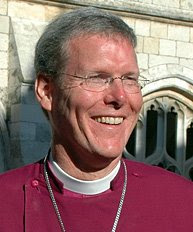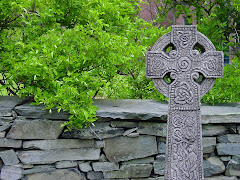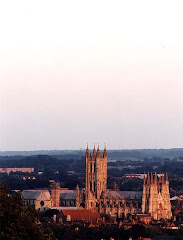 Yesterday was officially “London Day” in the Lambeth Conference schedule—which meant at the very least an early start to load some 1600 people (bishops, spouses, and staff) onto buses for the two hour trip to into London.
Yesterday was officially “London Day” in the Lambeth Conference schedule—which meant at the very least an early start to load some 1600 people (bishops, spouses, and staff) onto buses for the two hour trip to into London.Although the Archbishop of Canterbury hosted a luncheon at Lambeth Palace, and although the day culminated with a garden party with the Queen at Buckingham Palace, the most important part of the day, to my thinking, came at the beginning with the “Walk of Witness”—a public demonstration of 670 bishops and 1,500 other faith leaders, politicians, and diplomats—which began at Whitehall, then passed Downing Street, the Houses of Parliament, and Westminster Abbey before crossing the Thames and concluding at Lambeth Palace.
In the words of The Archbishop of Canterbury, the walk was intended to be “a poignant act of commitment by the Anglican Communion and other faith groups to continue to put pressure on those who have the power and resources to help end extreme poverty across the globe.” It was, he said, to be “about pledging, as a Church, to play our part in continuing to develop lasting solutions.”
Those words—a noble sentiment so easily spoken—assumed the form of a haunting and challenging question yesterday. With the words of Archbishop Ndungne, the former Archbishop of Southern Africa, spoken two years ago in Boksburg, South Africa ringing in my ears—that “we live in a world in which the rich are getting stinkingly rich while the poor are becoming desperately poor”—I could only be struck by the radical contrasts contained within the walk itself. Tourist waved at us eagerly from passing busses, eager only to get some video and photos for the record. Workers from office buildings, taking a break from the routine of the day, came out to watch an unquestionably intriguing sea of purple. A news helicopter circled, then hovered, then circled again, capturing footage for the evening news. Photographers and reporters circulated around the fringes of the walk taking statements and looking for photo opportunities. All of it was directed more to the spectacle than to the substance of the story itself .
Prime Minister of England, Gordon Brown, spoke both eloquently and passionately, without a single note, about the need for churches and governments to work together to eradicate poverty. When he finished, an English bishop standing beside me said simply "he really means it too." His speech, well worth hearing, can be found at http://www.number10.gov.uk/output/Page16019.asp. Reporter James Macyntire gave a thoughtful and accurate report on the walk itself in The Independent (see http://www.independent.co.uk/news/uk/home-news/what-the-activists-said-to-the-bishops-876802.html).
But add to the spectacle, the gathering at Lambeth Palace. Then follow that with tea with the Queen. Then insert, somewhere in the midst of it all, the glaring fact of global poverty—absolutely incomprehensible to those of us who live in the first world—set against a background of Whitehall and Downing Street and the Houses of Parliament, while at the same time I am walking side by side with brothers and sisters from Burundi and Sudan, and Zimbabwe and Burma who live daily with a kind of courageous witness to the gospel that is simply not known in our experience—and the only question that comes to mind is a plain and simple “why”?
While there is no disagreement on the sentiment of opposing global poverty, our collective will is sadly lacking. If we, the Church, do not speak a powerful word of compassion and equality and justice (the very words of our Lord) into the indifferent structures of our government and society, then who will? Is that not what the prophet Micah meant when he wrote, “and what does the Lord require of you but to do justice, and to love kindness, and to walk humbly with your God?”
It gets back, I think, to the fact that when it comes to participating in God’s mission “the road is made by walking it.” Period. End of sentence. This is what our world longs to see—not spectacle, but women and men of faith standing together courageously, without condition, in Love.
Until we Christians are willing quite literally to stand in complete solidarity with the poorest of the poor in our world, we bear witness to nothing more than a garden party and we have no good news to share with a world that not only needs it but is longing to hear it.



1 comment:
It’s important to see so many faith leaders concerned and committed to the need to end poverty all over the globe, in the Walk of Witness. I agree with you, it means that in the near future all the religions should pay special attention to the poorest of the poor in our world…
Ana
Post a Comment